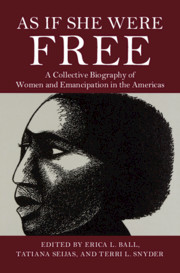Book contents
- As If She Were Free
- As If She Were Free
- Copyright page
- Dedication
- Contents
- Figures
- Contributors
- Elizabeth Catlett and the Form of Emancipation
- Acknowledgments
- Introduction
- Part I Claiming Emancipation during the Rise of New World Slavery
- Part II Experiencing Freedom during Slavery’s Expansion
- 7 Judith and Hannah: Eighteenth-Century Florida, South Carolina, and Virginia (US)
- 8 Sarah Chauqum, Eighteenth-Century Rhode Island and Connecticut (US)
- 9 Marion, Eighteenth-Century Natchitoches, Louisiana (US)
- 10 Anna Maria Lopes de Brito, Eighteenth-Century Minas Gerais (Brazil)
- 11 Juana Ramírez, Eighteenth-Century Oaxaca, New Spain (Mexico)
- 12 Juana María Álvarez, Eighteenth-Century New Granada (Colombia)
- 13 María Hipólita Lozano, Eighteenth-Century Lima (Peru)
- Part III Envisaging Emancipation during Second Slavery
- Part IV Enacting Emancipation in the Aftermath of Slavery
- Bibliography
- Index
11 - Juana Ramírez, Eighteenth-Century Oaxaca, New Spain (Mexico)
from Part II - Experiencing Freedom during Slavery’s Expansion
Published online by Cambridge University Press: 24 September 2020
- As If She Were Free
- As If She Were Free
- Copyright page
- Dedication
- Contents
- Figures
- Contributors
- Elizabeth Catlett and the Form of Emancipation
- Acknowledgments
- Introduction
- Part I Claiming Emancipation during the Rise of New World Slavery
- Part II Experiencing Freedom during Slavery’s Expansion
- 7 Judith and Hannah: Eighteenth-Century Florida, South Carolina, and Virginia (US)
- 8 Sarah Chauqum, Eighteenth-Century Rhode Island and Connecticut (US)
- 9 Marion, Eighteenth-Century Natchitoches, Louisiana (US)
- 10 Anna Maria Lopes de Brito, Eighteenth-Century Minas Gerais (Brazil)
- 11 Juana Ramírez, Eighteenth-Century Oaxaca, New Spain (Mexico)
- 12 Juana María Álvarez, Eighteenth-Century New Granada (Colombia)
- 13 María Hipólita Lozano, Eighteenth-Century Lima (Peru)
- Part III Envisaging Emancipation during Second Slavery
- Part IV Enacting Emancipation in the Aftermath of Slavery
- Bibliography
- Index
Summary
In eighteenth-century New Spain, free and enslaved African descent women challenged the social order by negotiating their social identities in various colonial spaces. Juana Ramirez was a freed African descent woman who was labeled as both a mulata and an Indian woman in the historical record. In 1761, Juana was interrogated by inquisitors in Antequera for transforming herself into a tall, white figure. In the context of this Inquisition case, Juana’s legal and social statuses were questioned, and local authorities reported that Juana was a mulata criolla and that she was not a “pure” Indian woman. The authorities also indicated that they initially could not pinpoint her social status and thus, they initially referred her case to the Juzgado General de Indios. The uncertainty of Juana’s ethnic background suggests that she possibly proclaimed her indigenous identity to attain her legal freedom at an earlier point in the eighteenth century. By analyzing Juana’s behavior in enslavement and freedom, this chapter highlights how African descent women navigated the Spanish colonial courts and relied on self-fashioning to secure their state of freedom in the Spanish colonial world.
- Type
- Chapter
- Information
- As If She Were FreeA Collective Biography of Women and Emancipation in the Americas, pp. 207 - 217Publisher: Cambridge University PressPrint publication year: 2020
- 1
- Cited by

